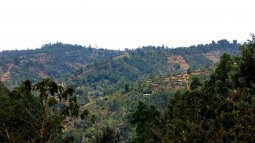Chorongi coffee factory is part of the Mutheka Coffee Farmer’s Society, consisting of more than 5600 active farmer members, with around 1000 of them belonging to Chorongi. Smallholder farmers delivering cherry to the factory have an average of 250 coffee trees each. Other crops grown are maize, bananas and beans. For shade the farmers may plant a combination of gravellea, macadamia, or eucalyptus. The factory is receiving assistance from our partner Coffee Management Services (CMS). The long term goal is to increase coffee production through farmer training, input access, Good Agricultural Practice seminars, and a sustainable farming handbook updated and distributed annually. Our wish is to establish a transparent, trust based relationship with the smallholder farmer, helping to support a sustained industry growth in Kenya, whilst bringing premium quality to our customers, and premium prices to the farmers. As a result of the combined efforts of CMS and the Mutheka farmers, Chorongi has increased their production, going from less than 50,000 kgs of cherry in 2010/11 season to almost 250,000 kgs in 2013/14 season. Through the pre-financing they receive, farmers are given advances for school fees and farm inputs. The factory manager is re-trained every year by CMS, in addition to field days being held by the minister of agriculture and agrochemical companies that deliver inputs to the farmers. Demonstration plots are planted at the factory to reinforce the best practices taught throughout the year. After picking, ripe cherry is brought to the factory before it undergoes processing to remove the skin and pulp – known as the wet processing method. Wastewater is discarded in soaking pits, and is also recirculated for conservation. The factory is using a disc pulper with three sets of discs to remove the skin and fruit from the inner parchment layer that is protecting the green coffee bean. After pulping, the coffee is fermented overnight to break down the sugars, before it is cleaned, soaked and spread out on the raised drying tables. Time on the drying tables depends on climate, ambient temperature and volumes under processing, and can take from 7 to 15 days in total.
For more information on Kenyan coffee, visit our Kenya Origin Page.


